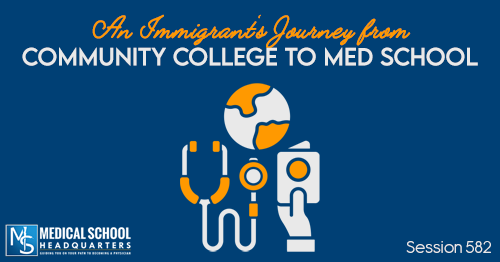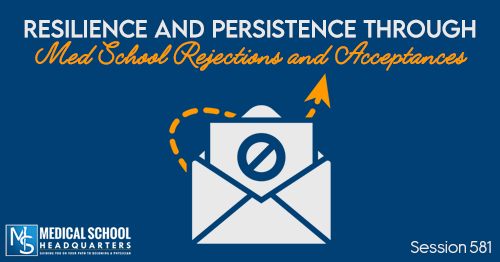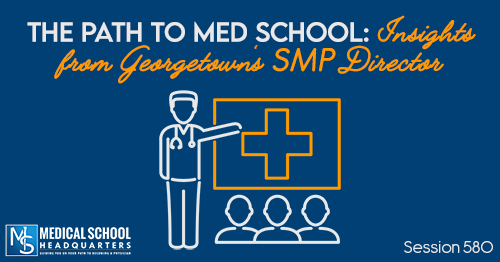Apple Podcasts | Google Podcasts
Session 550
Between two jobs, multiple clubs, and helping around the house, Alex had been a workaholic since she was 15. When she reached college, burnout hit.
For more podcast resources to help you with your medical school journey and beyond, check out Meded Media.
Listen to this podcast episode with the player above, or keep reading for the highlights and takeaway points.
Alex’s Dream of Becoming a Physican
Alex first realized she wanted to be a physician when she was around 9 years old. She had originally wanted to be a veterinarian because she grew up on a farm surrounded by animals. During a dentist appointment, the dentist asked her what she wanted to be and suggested that she could take care of humans instead of just animals. This was the first time Alex considered becoming a doctor.
Choosing Biomedical Engineering
Alex planned on being premed when she headed off to college. However, she also thought about having a backup plan in case she didn’t get into medical school. This led her to choose biomedical engineering as her undergraduate degree. It provided both a backup career option and collaboration opportunities with her university’s medical school. She found biomedical engineering to be a good fit because of her interests in math and science as well as her desire to do something different from the typical biology major.
Alex knew about biomedical engineering as a potential major because of her older sisters, who were both electrical engineers. They had always told her that if she was smart and hardworking enough to get an engineering degree, it would open many doors for her and teach her valuable math and science skills.
When researching engineering programs at her university, she discovered they had a strong biomedical engineering program. Plus, it had a collaboration between the engineering school and medical school. This seemed like a great fit that could give her a backup career option while still pursuing her interests in science and medicine.
How Her Biomedical Engineering Major Could Impact Medical School Admissions
Alex did have some concerns about how her biomedical engineering major and harder class load might impact her ability to get into medical school. She acknowledged that the engineering classes were very math and science heavy.
However, she found that some of her premed classes were actually even harder than the engineering classes, likely due to the competitive nature of premed students. This led to steeper curves in those classes.
While she didn’t think about this too much when choosing her major, she was aware that medical schools look closely at GPAs and her classes may have been more challenging than a typical biology major. However, she got through it successfully and felt her engineering problem-solving skills helped her do well.
Alex believed there were some advantages to not being surrounded by the typical cutthroat premed culture as a biomedical engineering major. While she still took premed classes with other premed students, she felt the curves in her engineering classes were less competitive since those students were not all gunning for medical school.
It was also nice for her to have some “regular” non-premed friends to escape the constant premed talk. However, she acknowledged there could also be benefits to being immersed in the premed environment. Overall, she felt it was good to have a mix of peer groups.
Her Premed Research Experience
Alex mentioned that she chose biomedical engineering research as her undergraduate job and research experience. She worked in a lab studying digital human modeling to create prediction models for optimal human posture when carrying different loads.
While she enjoyed the work and found the research fascinating, she realized she preferred more human interaction over sitting at a computer all day. This experience reinforced for her that medical school was the best path, while still allowing her to potentially utilize her engineering skills in the future.
“I realized that med school was the path that I still wanted to go down, but potentially still use my engineering skills in the future.”
When she was in college, Alex tried to keep her career options as open as possible by gaining different experiences that could be useful in the future. During her biomedical engineering training, she had to complete a senior design medical device project. This exposed her to the medical device design process and patent system.
While she didn’t have a set 10-year plan, exploring areas like patents gave her skills she thought could be valuable if she had a device idea later in her career as a physician. Her goal was to gain unique experiences that may help open doors without locking herself into only one specific path like medical device design.
The Hardest Part of Being a Biomedical Engineer Premed
Alex felt that the hardest part of being a biomedical engineering major premed was that her course load was very math and science heavy, with little room for other types of classes. She didn’t take many history or anatomy classes to directly prepare her for medical school. This led to more of a learning curve when she began her medical education.
She had to shift gears to memorizing large amounts of information rather than problem solving. However, she believed her engineering training helped her succeed in the challenging curriculum.
How Her Biomedical Engineering Background Stood Out in Medical School Applications
When applying to medical school, Alex felt that her biomedical engineering background and experiences like her senior design medical device research project gave her a unique perspective to discuss in her applications.
While other students could talk about typical lab research or coursework, she was able to describe her hands-on engineering project. This provided a different spin on her experiences that helped her applications stand out compared to more standard biology pre-med majors. It demonstrated her diverse interests and skills to medical school admission committees.
Alex’s Thought Process for Choosing Her Neonatology Specialty
When asked about how she evaluated specialties with her biomedical engineering background in mind, Alex said she didn’t really think about choosing a specialty that way. She kept her options open during medical school and found her interests developed based on experiences during her training. She was drawn to pediatrics because of her enjoyment of working with children.
Her interest in neonatology specifically emerged as she saw the cutting edge technology saving very premature babies that couldn’t have survived just a decade prior. While she didn’t consciously pick it for the engineering aspects, her background aligned well with the specialty’s focus on technology and innovation.
“When you’re choosing your specialty, you’re trying to figure out where do you fit in?”
How Her Engineering Background Informs Her Work as a Physician and Researcher
As a practicing neonatologist, Alex doesn’t use her biomedical engineering background directly in daily patient care. However, she does draw on some of her knowledge when teaching medical students about ventilator equations and concepts.
In her research, she utilizes her engineering problem-solving skills and programming background more extensively. For example, she collaborates on developing predictive algorithms using patient data to help with care decisions.
While she isn’t programming constantly as a physician, her engineering training proved valuable. She’s becoming involved with clinical informatics and improving electronic health records from within the medical field.
How Alex’s Engineering Training Shaped Her Problem-Solving Approach to Medicine
Alex believes her engineering training helped develop thought processes that make certain medical concepts easier for her to understand compared to others. She notes that as an engineer, the focus is not just on memorization but comprehending the underlying processes and equations.
This analytical problem-solving approach helps Alex grasp physiology and patient situations on a deeper level rather than just memorizing symptoms and treatments. She thinks engineering graduates may find patterns and connections more readily through this style of critical thinking cultivated in their undergraduate studies.
Alex’s Clinical Informatics Research
Alex does clinical informatics work as part of her research. This involves using data extracted from electronic health records to complete tasks like building predictive models and analytics reports. She collaborates with computer scientists to develop algorithms that can predict things like the optimal time for extubating neonates using continuous physiological data from the NICU.
Alex also works to directly improve her hospital’s EMR system as a physician builder. She has experience with computer programming from her biomedical engineering undergraduate work. Her clinical informatics research utilizes her engineering skills while also informing improvements to patient care through data-driven insights.
“As humans, we can’t process or comprehend all the data that we’re collecting every single second.”
Machine Learning’s Role in Medicine
Alex is optimistic about the potential for machine learning and AI to transform healthcare in a positive way. She believes humans will still need to be involved to ensure safe and appropriate use of these technologies. She compares early concerns about tools like Excel replacing accountants to how AI assistants today are simply productivity aids that require human judgment.
In medicine, algorithms could automate documentation to reduce physician burden, but clinicians will remain essential to carefully review outputs and provide clinical context. With more physician education on these topics, Alex thinks AI can be developed to best support doctors rather than replace them. Overall, she is excited about advances while recognizing the need for careful implementation and continued human oversight.
The Wide Reach of Biomedical Informatics
Alex explains that biomedical informatics is a broad field encompassing many areas of study related to using data and technology in healthcare. It includes bioinformatics focused on genetics and genomic and clinical informatics dealing with EHRs and patient data. It also includes predictive modeling through machine learning and general data analytics like report and dashboard development.
“You can go into just data analytics and how are we building reports or dashboards to help analyze the patient data we’re collecting all the time.”
Many people may already be doing informatics work without realizing it falls under this umbrella term. The field continues to expand as technology infiltrates more aspects of clinical research and practice.
Alex’s Perspective on ChatGPT and the Role of Physicians in AI Development
Alex acknowledges the hype around ChatGPT but also understands physician concerns since they didn’t train with an understanding of large language models. However, she sees ChatGPT and future AI as analogous to the introduction of Excel. At that time, people were skeptical it could replace accountants but now can’t imagine working without it.
While the technology improves, humans will still need to be involved to ensure AI applications are appropriate, safe and addressing the right questions.
More physician education on these topics is important so they can better craft algorithms and keep them helpful. Overall, Alex doesn’t think AI will replace doctors anytime soon but sees it transforming healthcare if implemented carefully with continued human oversight.
“It is going to be transforming healthcare, but I don’t think it will be replacing physicians anytime soon.”
Programming Language Exposure for Premed Students
Alex recommends that premed students get exposure to programming through classes or online courses. Python is a commonly used language that would provide useful skills. Courses on statistical software like R are also applicable. For an introduction to AI/machine learning concepts, massive open online courses from top universities could be beneficial.
Any opportunities to learn programming basics would help students keep their career options open and prepare to get involved in medical research like clinical informatics.
Clinical Informatics Fellowship
Alex mentions that there is a new two-year clinical informatics fellowship available for physicians interested in gaining more skills and experience in this field.
During the fellowship, fellows would spend 20% of their time doing clinical work and 80% focused on working with data under the guidance of informatics experts. This presents an opportunity for those who have already graduated medical school to further develop competencies in areas like predictive modeling, analytics and improving electronic health records.
More institutions are recognizing the need for physician leaders who can bridge the gap between clinical care and data-driven technologies through targeted fellowship programs like this one focused on AI and informatics.
A Potential for Being a Stand-Alone Specialty
Alex believes that informatics could certainly become a standalone specialty for some physicians in the future.
Many current leaders in the field have transitioned fully into informatics roles after gaining clinical experience. However, when first starting out, Alex thinks it’s important to maintain some level of clinical duties to truly understand healthcare delivery challenges from a practitioner perspective.
With experience, individual departments may designate their own dedicated informatics specialists to focus solely on data initiatives while still consulting clinicians. Overall, as the need grows, more physicians may pursue informatics as a full-time specialty once the field is more established.
Alex’s Vision for Reduced Physician Burden from Charting Through Advancing Technologies
Alex believes that in the future, physicians may no longer need to spend hours each day manually charting patient notes like they currently do. Technologies like voice recognition and natural language processing are advancing rapidly. Some systems are already piloting the ability to automatically generate templated notes based on recorded patient conversations. While human review and editing will still be required, this could significantly reduce the documentation burden.
With optimization of EHR systems and better training for clinicians, charting workload could also be lessened. Overall, Alex envisions that within the next few years technology may make it easier for physicians to focus more on direct patient care rather than documentation tasks after hours.
“Clinicians will still need to do some things and double-check things. But technology is rapidly advancing.”
Final Words of Wisdom
For students interested in clinical informatics, Alex recommends checking out the American Medical Informatics Association (AMIA) for information on conferences and getting involved in the field. When considering medical schools or residencies, ask programs about informatics research opportunities. The University of Iowa just started a clinical informatics fellowship for physicians wanting more focused training.
Finally, try to keep an open mind to different career paths and seek hands-on learning experiences, like programming classes. This can help premed students utilize diverse skill sets to improve healthcare through innovative technologies.












